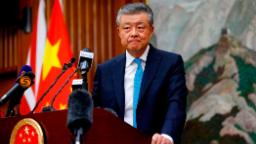
The apparent sexually explicit “like” was first identified by a London-based human rights campaigner on Wednesday. It quickly set off a storm online as Twitter users speculated about whether ambassador Liu Xiaoming’s account had been hacked.
The account also appeared to “like” at least one other post which was critical of the ruling Chinese Communist Party. It is not clear how long the apparent “likes” remained active, or when they first appeared.
A “like” on Twitter does not necessarily mean that the user is endorsing the content; “likes” are often used as bookmarks.
All of the “liked” tweets on the account have now been removed, apart from just two of his own posts from October 2019. The ambassador has more than 85,000 followers on his official account.
In a statement Wednesday, the Chinese embassy in London asked for Twitter to open an investigation.
“Recently, some anti-China elements viciously attacked Ambassador Liu Xiaoming’s Twitter account and employed despicable methods to deceive the public. The Chinese Embassy strongly condemns such abominable behavior,” the statement said.
“The Embassy has reported this to [Twitter] and urged the latter to make thorough investigations and handle this matter seriously. The Embassy reserves the right to take further actions and hope that the public will not believe or spread such a rumor.”
Liu himself retweeted the statement from the Chinese embassy, adding cryptically that “a good anvil does not fear the hammer.”
A spokeswoman for Twitter told CNN Business that there was nothing for them to comment on at present.
‘Wolf warrior’ diplomacy
Twitter is one of several US-based social media platforms that are blocked in China, along with Facebook and Instagram. Despite this, Chinese diplomats have increasingly been using Twitter to promote Beijing’s interests around the world.